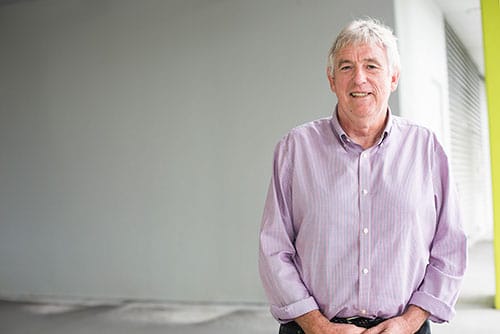
The University of Newcastle has received a grant from the National Health and Medical Research Council and the Cancer Council NSW to investigate patients’ preferences in relation to end-of-life care.

Laureate Professor Rob Sanson-Fisher will lead a team studying end-of-life cancer care.
The University of Newcastle has received a grant from the National Health and Medical Research Council and the Cancer Council NSW to investigate patients’ preferences in relation to end-of-life care.
The multidisciplinary research team behind this study brings a unique blend of clinical, legal, behavioural, bioethics, health economics, information technology and biostatistics expertise.
Laureate Professor Robert Sanson-Fisher AO, Director of the University’s Centre for Health Behaviour and co-leader of HMRI’s Public Health program, will lead the research study titled ‘Who decides and at what cost’. The research will address community concerns about the care of terminal cancer patients who may be offered more therapy at the end-of-life than they might want if their views were sought.
“People who receive end-of-life care consistent with preferences are said to experience higher quality of life, and lower physical and psychological distress,” Professor Sanson-Fisher said.
“However, patient preferences often aren’t clearly communicated to providers and families, who become surrogate decision makers. Providers then have to rely on the perceptions and personal views of the surrogates rather than the patients themselves.
“The consideration of advance care directives is an important but sensitive and often difficult matter in healthcare. This research will consider the important issue of effective decision making by cancer patients, their families, or surrogates, and oncologists.”
Professor Sanson-Fisher has questioned the lack of a national plan for the preparation of people and family caregivers when they are “expecting” to approach the other end-of-life’s continuum, comparing end-of-life to childbirth.
“It makes good sense to plan for impending birth. It increases the chance of good health while reducing fear and stress. Planning helps the family to develop a shared sense of responsibilities and values.”
Professor Sanson-Fisher said death is also certain and our risk of dying or experiencing serious illness increases as we age. There are many critical decisions to be made, yet many people are unable to make some or all decisions as they approach the end of their lives.
can make a crucial difference. Some folks will experience serious illness in the form of acute emergencies. However, it’s more common for serious illness to come in the form of a set of chronic and progressively disabling conditions,” he said. “What if we started by accepting that illness and end-of-life occur? What lessons could we derive from childbirth and parenting classes?”
This will also be the first study to provide clinically relevant data on the degree to which providers and surrogate decision makers accurately reflect cancer patients’ end-of-life decisions over time. This information will inform strategies to improve awareness of end-of-life care options and advance care planning within the community.
HMRI is a partnership between the University of Newcastle, Hunter New England Health and the community.
HMRI would like to acknowledge the Traditional Custodians of the land on which we work and live, the Awabakal and Worimi peoples, and pay our respects to Elders past and present. We recognise and respect their cultural heritage and beliefs and their continued connection to their land.

Hunter Medical Research Institute
We’re taking healthy further.
Locked Bag 1000
New Lambton
NSW, Australia, 2305



This site is protected by reCAPTCHA and the Google Privacy Policy and Terms of Service apply.
Copyright © 2024 Hunter Medical Research Institute | ABN: 27 081 436 919
Site by Marlin Communications
